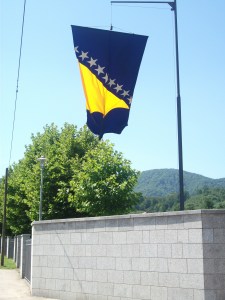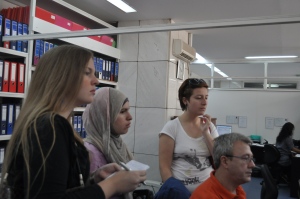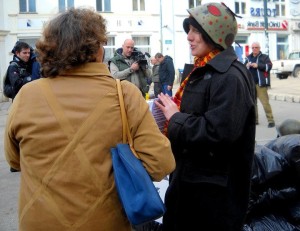Originally posted on In Women’s Hands, the following post will serve as an introduction to my trip to Bosnia and the amazing friends I made there.

The flag of Bosnia & Herzegovina at the Srebrenica-Potocari Memorial and Cemetery. Photo by Morrarovic Photography
With different goals reached through the use of various tactics in distinct circumstances, it may be difficult to see the similarities in the nonviolent struggles that Leila Seper, Advija Ibrahimovic, and Iltezam Morrar are actively involved in. While their situations are diverse, they are each struggling somehow for the same things: equality and justice. Fighting for justice, in its many forms, is not just an option for these three dedicated women and the activists by their sides– it is a necessity.
The other commonality among them is their age: all of them represent the new face, the next generation of women activists. Skilled in social media, willing to face risks, and aware of the fact that the more people who understand their struggle, the broader impact they will have, Iltezam, Advija and Leila have accepted that changing the world — locally, nationally, and globally — is a daily responsibility.
Leila Seper, an outspoken member of Sarajevo’s young and expanding activist community, uses her quirky sense of humor, and the brand recognition of Dosta!, to actively demonstrate to Bosnians of all ethnic and religious groups that they must fight for equality and human rights. An active supporter of worker’s rights, student rights, environmental protections and women’s rights, Leila takes on every challenge with conviction, enthusiasm, and a sense of humor.
Advija Ibrahimovic, the youngest member of the Women of Srebrenica Association, has learned the skills of successful activism from some of the most seasoned activists in Europe – the Women of Srebrenica. Fighting for legal justice, accountability, and recognition of the horrors that took place during the Srebrenica genocide that left her and her siblings orphans, Advija has also been educated as a nonviolent action trainer by the Alternatives to Violence Programs. Chosen to represent the Association during the 2003 unveiling of the Srebrenica-Potocari Memorial and Cemetery, where she stood alongside President Bill Clinton, Advija’s upbeat, confident demeanor is contagious.

Hajra Catic, President and Founder of the Women of Srebrenica Association with Iltezam. Photo by K. Spangler
Iltezam Morrar, a wise-beyond-her-years medical student from Palestine currently studying in Sarajevo, draws on her family’s long history of nonviolent action in the continuing struggle against the Israeli occupation. Hearing her grandmother, father and uncles tell stories of their nonviolent activism during the First Palestinian Intifada, Iltezam became inspired to join the struggle at the age of 15. Her actions, and those of her fellow villagers in Budrus, quickly became exemplars for the next generation of Palestinian activists following the success of the Just Vision documentary highlighting their nonviolent struggles against the wall.
In the process of learning to identify with seemingly disparate women and reminiscing about nonviolent successes everyone went away with fresh insights and inspiration, as well as new friends. Leila taught us to keep a sense of humor even in the face of injustice, and to work with the authorities whenever possible to reassure them violence is not an option. Advija taught us that persistence pays off, and that even the humblest of citizens has the power to affect international politics when using the right methods. Iltezam too, taught us the importance of tenacity, and the need for clearly stated objectives when battling a much stronger opponent.

Leila, Iltezam and I watch as the International Commission on Missing Persons makes a positive DNA match to a fragment of remains found in a mass grave from the Srebrenica Genocide. Photo by K. Spangler
Each woman came away from our gathering with something different. Leila explained, “I get motivation from these meetings, when I see their [Women of Srebrenica] strength to fight.” Advija agreed, “You have to be determined. That’s the example for me.” Iltezam summarized everyone’s feelings in her own way, “I’m honored to be here to learn from these women.They are so strong, and we have so much to learn from them. They never give up.”
Our meeting proved to be a unique opportunity to learn, share and grow, and the inspiration from each woman’s struggle is sure to be a source of strength for each of us for years to come. And that’s exactly what we hoped for.



August 30th, 2011 at 17:44
[…] Three Women, Three Struggles « Feminist Activism Leila Seper, an outspoken member of Sarajevo's young and expanding activist community, uses her quirky sense of humor, and the brand recognition of Dosta!, to actively demonstrate to Bosnians of all ethnic and religious … Source: feministactivism.wordpress.com […]